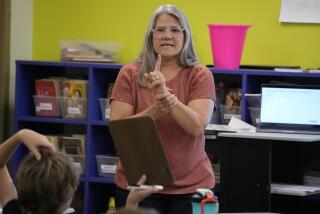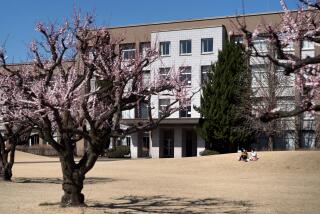Japan Wants Its Students to Learn --for the Joy of It
- Share via
TOKYO — There’s no joy in Mathville.
Even as Americans--led by their self-proclaimed education president--fret over science and math scores and weak basics, Japanese are wringing their hands over their lack of joy, zest and fun.
Japan’s perceived delight deficit was highlighted by the release of a comparative international education survey. Although eighth-graders here ranked comfortably near the top, as usual, for their ability to solve math and science problems, parents and educators were startled to see just how much the students hated these subjects.
“Everyone was really quite taken aback,” said Katsuhiko Maeda, senior curriculum specialist with the Education Ministry, “especially because our students are so good at math and science.”
The survey issued in December by the Amsterdam-based International Assn. for the Evaluation of Educational Achievement ranked Japan’s students No. 36 out of the 37 nations surveyed for their interest in math--just above Moldova--and No. 22 out of 23 for their interest in science.
Fun and enjoyment are not commonly associated with education in a nation famous for its “entrance exam hell,” rote learning and bullying. It’s not uncommon for Japanese junior high students to attend regular classes and special cram schools from 8 in the morning until 10:30 or 11 at night.
“I absolutely hate both math and science,” said Risa Sekikawa, a 15-year-old who attends a Tokyo high school. “I don’t like science experiments, and I hate arithmetic because I can’t understand anything they’re saying in class.”
Although students everywhere like to complain about school, Japanese parents and educators fear that such widespread erosion of enjoyment will lead to a sharp drop in standards. And for traditionalists, that spells disaster, given this nation’s reputation for world-class products and its heavy reliance on applied science and engineering.
In response, the Education Ministry is touting a revised curriculum due out by next year that will encourage flexibility, “education of the heart” and ikiruchikara, or “zest for living.” The plan calls for more electives, a five-day school week--down from six--and at least three hours a week of flexible time.
Behind the debate over how to make fractions fun and experiments exciting is a broad-based fear that Japan is not producing the type of graduates required in the 21st century.
Japan’s rigorous conformity and centralized education policies arguably served the nation well during the economic boom years, when it needed a relatively uniform work force for its factories and corporate ranks.
But globalization has placed a premium on imaginative individuals able to question authority and reason through problems. These abilities, many believe, are not tolerated--and so, hardly encouraged--in the education system.
In spite of its new, soft approach, the Education Ministry is as control-oriented as ever, critics say. Kazuo Nishimura, a math professor at Kyoto University and head of a group opposed to the new curriculum, says the bureaucrats are way too meddlesome in some areas and way too relaxed in others.
On the one hand, large class size and rigid standards still leave little room for local autonomy or diversity. On the other, textbooks have been dumbed down, with most explanations, difficult problems or sample exercises removed, he says. And the number of hours spent in class is among the lowest for industrialized nations--and getting lower, he adds.
“ ‘Zest for living’ sounds nice, but their policy is actually quite the opposite,” Nishimura says. “There’s a crisis in Japanese education. The entire system isn’t working well.”
As with education issues in many countries, there has been lots of finger-pointing. Some experts blame politicians for promising reform and not carrying through. Others knock parents for not fostering a love of learning, teachers for a shortage of imagination and schools for their lack of accountability.
As their elders debate their future, students like 16-year-old Tatsuo Sakai grapple with their equations and reagents despite their avowed lack of interest.
“If I had my way, I wouldn’t take math and science at all,” says Tatsuo, the son of a math teacher. “I can’t see how it’s going to be useful. I just want an easy life completely free of all this complex stuff.”
*
Makiko Inoue in The Times’ Tokyo Bureau contributed to this report.
More to Read
Sign up for Essential California
The most important California stories and recommendations in your inbox every morning.
You may occasionally receive promotional content from the Los Angeles Times.













